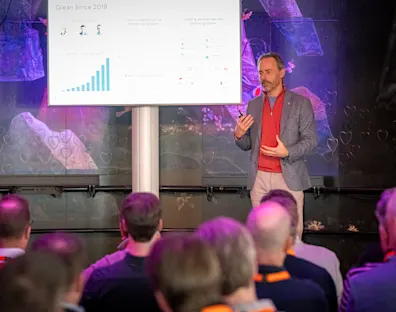

Floris Weegink
Field CTO
6 min read
13 October 2025
Your colleague doesn’t know the answer. But your AI search engine does.
Sound familiar? Hours lost searching for that one document or process that’s “somewhere out there”? Your colleague doesn’t know—but your AI search engine does. No more endless scrolling: just talk to your business data and get direct answers in seconds!
Remember that one time you spent an hour looking for a specific contract? Or that procedure you knew was saved somewhere—just not sure where? Meanwhile, the clock kept ticking and your client was still waiting. In most organizations, this is a daily reality. Documents disappear into digital drawers and everyone’s constantly searching for information that does exist—if only they knew where.
AI search changes that. No more endless scrolling through folders—just instant answers from your own company data. Time to discover how.
Why traditional search fails
About twenty years ago, I started diving into enterprise search: making all company data searchable. The core issue then is still the same today: traditional search relies on keywords. You type “bike,” but the document you’re looking for refers to it as a “bicycle”? No match. We tried solving it with synonyms and wildcards, but that just brought more irrelevant results and less precision. You still had to dig through dozens of documents to find the right one.
The real problem? If you search for “drilling platform 200 kilometers north of platform A”, because you’ve forgotten its actual name, but all the documents refer to “platform B,” you’ll never find it. Your query and the right document simply don’t align.
AI search breaks that barrier by understanding context, not just letters. It gets that a “handbrake” might be related to that “bike,” even if those words don’t sit side by side. Vector-based search makes this possible by using tokens that capture meaning, not just spelling.
From searching to talking with your data
Here’s another big shift: traditional search gives you a link to a document - good luck figuring out where your answer is within those thousand pages. AI search reads the document for you and gives you a summary of exactly the part you need.
Now it gets interesting: how does AI know which document is most important? Traditional systems just throw all the content into a database and hope for the best. Smart AI search looks at relevance signals: who wrote it, when it was created, who collaborated on it, whether comments were approved, if it’s been referenced elsewhere, how the author relates to you as the reader.
These signals determine which content gets higher relevance. Without strong relevance signals, you get nice-looking answers built on poor sources.
You’re literally having a conversation with your data instead of just searching through it. ChatGPT did this for the internet. Now we do the same for your enterprise data. You bring AI to your data - not the other way around.
What do you really gain?
Finding things a little faster might not sound revolutionary. But look at it this way: you’re unlocking all the knowledge your company already has and making it available to anyone who needs it. It accelerates your business because your data no longer sits trapped in silos but it flows through your organization.
Teams make faster decisions based on up-to-date info from contracts, manuals, and procedures. And in the end, you’ll get more done with the same number of people, because you’re saving hours of search time.
And here’s where it gets even more powerful: AI search is the red carpet to AI agents. Together, they form the foundation of an intelligent knowledge base that autonomous AI agents can work on. These agents use indexed content as context for reasoning. So instead of just retrieving answers, they can perform actual tasks. From drafting reports to making operational decisions, all based on real-time enterprise data.
That’s how AI search evolves from a personal productivity tool to a strategic foundation for enterprise automation.
Four choices for your organization
If you’re reading this, you have four options:
Do nothing
You could stop reading and go grab a coffee. But your company would still be stuck with data in boxes and folders, while AI makes that collective brain accessible to everyone.
Go with Microsoft Copilot
Copilot offers AI-powered document search. But it’s always within departments or vertical silos. True AI search is end-to-end and spans your whole organization. Copilot is fine for personal productivity and departmental tasks, but it doesn’t solve the deeper issue. It’s office automation plus-plus.
Build it yourself
Be honest; when was your last successful in-house IT project? That’s what we thought. There are “ready-made” AI search solutions that sound easy. But all you’re doing is throwing flat content into a vector database, without the relevance signals that tell you which documents actually matter. Congrats, you’ve just put a lot of effort into a weak version of Copilot.
Bring in an expert
This is the only real solution, in our view. At Incentro, we combine years of enterprise search experience with modern AI. We understand the age-old concepts of garbage in, garbage out, relevance scoring, content management, and access control. If you don’t have permission to view a document, you shouldn’t get the answer either. These seemingly small things determine whether your AI search engine actually succeeds.
How we help
We’re one of the few preferred Glean partners in the Netherlands. Glean has the same deep search background we do, former Google engineers who worked on enterprise search before it went mainstream. They’ve productized the RAG (Retrieval Augmented Generation) concept with an admin panel you can actually use - no internal hobby projects that go off the rails.
What sets Glean apart? They understand how to recognize relevance better than most. They index not just text, but also metadata: who wrote it, who collaborated, whether comments were approved, how documents are linked. These signals ensure you don’t get polished answers based on weak sources.
But Glean is more than just search. It’s an agentic AI platform that turns valuable content into real context for AI agents. So instead of agents just hallucinating random things, you get sharp, reliable assistants.
For companies that don’t want the full Glean license, we also build custom solutions. We’ll take a specific context - say, product knowledge from sales to service - and build a smart agent that works across departments but stays focused.
Who should care?
Honestly, AI search isn’t a game-changer for every company. If you’ve got a team of ten to fifteen people, you can just walk over and ask someone. But for mid-sized to large companies, that’s no longer realistic. Departments want to search across the org. At that point, AI search isn’t a luxury, it’s a strategic necessity.
Do you need thousands of employees to benefit from AI search? Nope. Once you hit around 100 employees, it starts to make a real difference.
Stop searching. Start finding.
Whether you choose Glean or a custom solution, we’ll help you go beyond enterprise. Because your people have better things to do than spending an hour digging for info that’s already there.
They’ll go from endless searching and delayed action to instant insight and real progress. Curious where AI search could make the biggest difference for your organization? Let’s talk.
Find out more
Read some more about the promising opportunies of AI for B2B businesses? Don't miss out on this orangepaper we wrote on that!

4 min read
Next-level enterprise search: how Glean looks beyond the AI hypes

5 min read
BAS World accelerates international growth with AI agents for sales, service and pricing

4 min read
Why AI doesn't work on legacy and how iPaaS makes it possible

4 min read
The 4 essential building blocks of an AI-ready data platform
